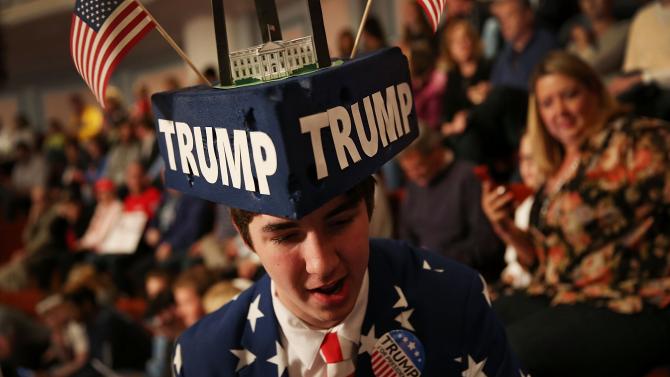[ad_1]

Michael Kuzma shows his support for Republican presidential candidate Donald Trump during his campaign stop at the Palladium at the Center for the Performing Arts in Carmel, Ind., on May 2, 2016.
Joe Raedle/Getty Images
The Indiana primary will likely be the sad ending to what looked to be one of the most exciting presidential primary seasons in recent history. On the Republican side we’ve seen a field of 17 candidates whittled down to just Donald Trump, Texas Sen. Ted Cruz and Ohio Gov. John Kasich. However, it’s increasingly looking as if Trump will succeed in knocking off his last two challengers. On the Democratic side, Indiana may be the end of a wall-to-wall drubbing. Vermont Sen. Bernie Sanders’ campaign has been competitive, but Hillary Clinton leads in every state poll. What will the final results of the Indiana primary hold? There are three possible scenarios:
1. The front-runners win.
Most polling in Indiana shows Trump with a double-digit lead over Cruz, and Clinton leading Sanders by about 5 to 7 percentage points, just above the margin of error. If Trump wins on the Republican side, he’s all but assured to win the Republican nomination on the first ballot at the Cleveland convention in July. Trump needs only 241 more delegates to reach the 1,237 threshold, and if he can win the majority of the 57 available in the Indiana primary, there won’t be much of a chance of any other candidate stopping him.
If Clinton wins, the Sanders campaign will be forced to admit, at least internally, that the campaign is continuing only in order to make ideological points, as opposed to really winning. Clinton needs only about 220 delegates to reach the finish line to become the Democratic nominee, and a victory in Indiana would be more about getting Sanders to give up than pushing her toward what is now an inevitable nomination.
A Cruz victory in Indiana would mean several things for the Republican Party and the race in general. First, it would prove that the “anti-Trump” forces can actually put together a victory that defies the polls. More specifically, it would mean that despite most polling in Indiana showing Cruz losing, the grassroots fear of a Trump Republican nomination, along with larger party fears about a loss in November, can flip the script. In addition, a Cruz victory would feed into the narrative that after weeks of stunts (the Cruz-Kasich alliance, selecting Carly Fiorina as his vice president), his campaign still has enough juice to bring about a contested convention.
This week Sanders has said that he believes a contested convention is likely for the Democrats, too, and while mathematically this is incredibly unlikely, a win in Indiana would give Sanders more potential influence over what Clinton does down the road as the likely nominee. Indiana is another open-primary state, meaning that you can vote no matter what your party affiliation. Sanders has done well in states in the Midwest, with large white populations and open primaries, so in theory, Indiana might be the kind of state where he makes a final stand.
At this point, given the number of delegates remaining for both Republicans and Democrats, the only real change in strategy would come from a Cruz victory over Trump and a Clinton victory over Sanders. If Trump defeats Cruz and Sanders beats Clinton, not much will change. It will mean that a contested Republican convention won’t happen, which is hugely disappointing for the news outlets hoping for a melee, but most Republicans resigned themselves to a Trump GOP nomination after he swept the Northeastern primary states on Super Tuesday, part 3. Sanders will stay in the race no matter how Indiana turns out, so a victory doesn’t so much change the nature of the Democratic race as it simply drags out a sad but inevitable conclusion.
[ad_2]





















